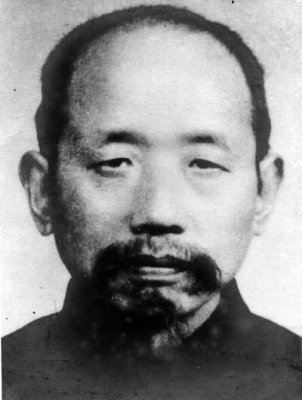Views
(Created page with 'Wang Enyang == '''Wáng Ēnyáng 王恩洋 (1890-1949)''' == Wáng was a student and professor of Buddhist philosophy, especially Faxiang-Weishi ...') |
m |
||
| Line 3: | Line 3: | ||
== '''Wáng Ēnyáng 王恩洋 (1890-1949)''' == | == '''Wáng Ēnyáng 王恩洋 (1890-1949)''' == | ||
| - | Wáng was a student and professor of Buddhist philosophy, especially | + | Wáng was a student and professor of Buddhist philosophy, especially Dharmalakṣaṇa and Consciousness-Only 法相唯識 |
| - | * Born [[1897]] (Guāngxù 光緒 23) in Nánchōng county 南充縣, Sìchuān 四川 | + | * Born [[1897]] (Guāngxù 光緒 23) in Nánchōng county 南充縣, Sìchuān [[四川]] |
| - | * Died 1964 in Chéngdū 成都, Sìchuān 四川 | + | * Died 1964 in Chéngdū [[成都]], Sìchuān [[四川]] |
* Courtesy name 字: Huàzhōng 化中 | * Courtesy name 字: Huàzhōng 化中 | ||
'''Biography''' | '''Biography''' | ||
| - | In [[1919]] Wáng studied Indian philosophy at Beijing University. In [[1922]] he went to Nánjīng to study | + | In [[1919]] Wáng studied Indian philosophy at Beijing University. In [[1922]] he went to Nánjīng to study Dharmalakṣaṇa and Consciousness-Only under Ōuyáng Jiàn [[歐陽漸]] at his Chinese Inner Studies Institute [[支那內學院]], later taking a teaching position at the school and helping Ōuyáng to establish Faxiang University [[法相大學]]. Wáng worked as the head of education at the university and lectured on Fǎxiàng. The school stopped operation in [[1926]] when the National Revolutionary Army 國民革命軍 entered Nánjīng [[南京]]. |
In [[1927]] he returned to his hometown of Nánchōng to establish Guishan University [[龜山書院]] which accepted both lay and monastic students. It operated for 12 years but was forced to close in December of [[1941]] when its funding dried up as a result of the Pacific War. In [[1942]] he established the Eastern Culture and Education Research Center [[東方文教研究院]] at Shengshui Temple 聖水寺 in Nèijiāng 內江, Sìchuān. He published a book series entitled "Eastern Culture and Education" [[東方文教叢書]] and the magazine ''Culture and Education'' [[文教叢刊]]. | In [[1927]] he returned to his hometown of Nánchōng to establish Guishan University [[龜山書院]] which accepted both lay and monastic students. It operated for 12 years but was forced to close in December of [[1941]] when its funding dried up as a result of the Pacific War. In [[1942]] he established the Eastern Culture and Education Research Center [[東方文教研究院]] at Shengshui Temple 聖水寺 in Nèijiāng 內江, Sìchuān. He published a book series entitled "Eastern Culture and Education" [[東方文教叢書]] and the magazine ''Culture and Education'' [[文教叢刊]]. | ||
| Line 27: | Line 27: | ||
* 人生哲學與佛學 | * 人生哲學與佛學 | ||
* 起信論料簡 | * 起信論料簡 | ||
| - | |||
| - | |||
| - | |||
| - | |||
| - | |||
| - | |||
---- | ---- | ||
'''References:''' | '''References:''' | ||
| + | * {{ZJFRZ}} Pp. 601-606. | ||
* [http://zhihai.heshang.net/Article/fojiaoshi/njmyz/200709/40390.html 王恩洋在内江圣水寺] | * [http://zhihai.heshang.net/Article/fojiaoshi/njmyz/200709/40390.html 王恩洋在内江圣水寺] | ||
[[Category:Biography]] | [[Category:Biography]] | ||
Revision as of 08:57, 22 June 2009
Wáng Ēnyáng 王恩洋 (1890-1949)
Wáng was a student and professor of Buddhist philosophy, especially Dharmalakṣaṇa and Consciousness-Only 法相唯識
- Born 1897 (Guāngxù 光緒 23) in Nánchōng county 南充縣, Sìchuān 四川
- Died 1964 in Chéngdū 成都, Sìchuān 四川
- Courtesy name 字: Huàzhōng 化中
Biography
In 1919 Wáng studied Indian philosophy at Beijing University. In 1922 he went to Nánjīng to study Dharmalakṣaṇa and Consciousness-Only under Ōuyáng Jiàn 歐陽漸 at his Chinese Inner Studies Institute 支那內學院, later taking a teaching position at the school and helping Ōuyáng to establish Faxiang University 法相大學. Wáng worked as the head of education at the university and lectured on Fǎxiàng. The school stopped operation in 1926 when the National Revolutionary Army 國民革命軍 entered Nánjīng 南京.
In 1927 he returned to his hometown of Nánchōng to establish Guishan University 龜山書院 which accepted both lay and monastic students. It operated for 12 years but was forced to close in December of 1941 when its funding dried up as a result of the Pacific War. In 1942 he established the Eastern Culture and Education Research Center 東方文教研究院 at Shengshui Temple 聖水寺 in Nèijiāng 內江, Sìchuān. He published a book series entitled "Eastern Culture and Education" 東方文教叢書 and the magazine Culture and Education 文教叢刊.
After the establishment of the PRC, he served in various official positions before returning to Chéngdū in 1961 because of illness. He died in 1964. Over his lifetime he wrote more than 200 works on Buddhist and other subjects.
Important Works
- 摄大乘論疏
- 唯識通論
- 心經通释
- 佛學通論
- 人生學
- 人生哲學與佛學
- 起信論料簡
References:
- Yú Língbō 于凌波. Zhōngguó jìnxiàndài fójiào rénwù zhì 中國近現代佛教人物志. Běijīng 北京: Zōngjiào wénhuà chūbǎnshè 宗教文化出版社, 1995. Pp. 601-606.
- 王恩洋在内江圣水寺
